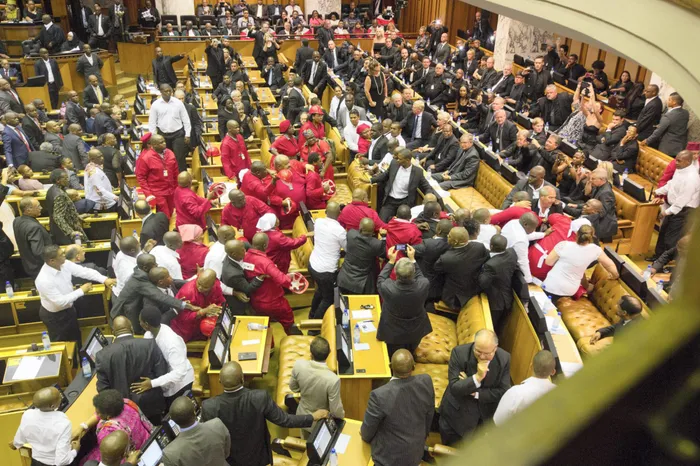Parliament: police are not police

EFF MPs clash with security personnel (in white shirts) after being ordered out of the National Assembly by the Speaker in February during the 'pay back the money' fracas. EFF MPs clash with security personnel (in white shirts) after being ordered out of the National Assembly by the Speaker in February during the 'pay back the money' fracas.
In a bizarre statement, Parliament on Monday justified the secondment of active policemen into its parliamentary protection services to boost its capacity to deal with unruly MPs, arguing the SAPS officials effectively became “staff members of Parliament” – even as they remained on the police payroll.
Dismissing opposition parties’ claims that such a move breached the separation of powers – police are part of the executive, a separate sphere to the legislature – Parliament said “any seconded officials will work under the direct authority of the Executive Authority (the presiding officers), and be directed by the accounting officer (the Secretary to Parliament).
“This means that officials seconded to the institution effectively become staff members of Parliament,” said Parliament.
While the national legislature said this move did not contravene the separation of powers, it acknowledged consulting the executive on boosting the capacity of its parliamentary protection services.
“In undertaking this task we are engaging with our counterparts in the executive for advice, support and partnership as part of the organs of the state which are independent of each other, but which are inter-related and operating with the necessary checks and balances,” Parliament said.
The controversial secondment of 22 policemen emerged at the weekend when City Press reported that Parliament had already briefed the SAPS members last Friday and bought them the uniform of parliamentary protection services – lime green shirts and black pants.
This could mean active policemen seconded to, and dressed like, the parliamentary protection services could be in the House sooner rather than later, as the service is stationed in the House during sittings.
However, Parliament on Monday said it “did not enlist the SAPS to perform any security function in the chamber. This means that SAPS uniformed police are not going to be enlisted as the first line of engagement unless there was a threat to life and/or a criminal act taking place”.
Outrage erupted at February’s State of the Nation address when police dressed as waiters in white shirts forcibly evicted EFF MPs, some of whom had raised points of order in an unprecedented move on such an occasion.
It subsequently emerged that at least some of those dressed like waiters belonged to the SAPS’s public order policing unit, colloquially known as the riot police.
Several opposition parties have already said they opposed using police as part of the parliamentary protection services.
A recent Western Cape High Court ruling outlawed the SAPS from the chamber and last week MPs revising the rules decided that the SAPS could only enter the chamber if there was an imminent threat to life or damage to property.
However, MPs across party political lines agreed the police would be responsible for the public gallery, and could take over just outside the doors to the House to escort expelled unruly MPs from the precinct.
The rules committee meets again today to take a final decision on this in the wake of repeated disruptions of sittings in the past 14 months. If approved, the revised rules are scheduled for adoption in the House on Thursday.
Parliament said the aim of the secondment of policemen was to boost the capacity of its parliamentary protection services with immediate effect.
Subsequently, Secretary to Parliament Gengezi Mgidlana confirmed the secondment of police to the parliamentary protection services. However, he added “on our part we are not in a position to talk about which support will be provided, not provided”.
Mgidlana emphasised Parliament was not geared up for the level of security needed in the chamber at this stage, and was looking at various options.
“We are putting together a plan. The plan will have specific details,” he said
The 2004 Powers, Privileges and Immunities of Parliament and Provincial Legislatures Act in Clause 4 expressly states security forces, like police, may enter and remain on the precinct of Parliament only “with permission and under the authority of the Speaker or the chairperson (of the National Council of Provinces)”.
When there is “immediate danger to the life or safety of any person or damage to any property”, security forces may enter without permission, but must report as soon as possible to the presiding officers, according to the Act.